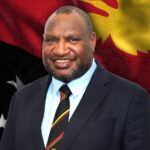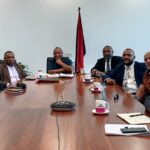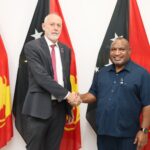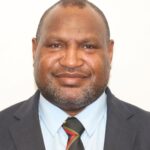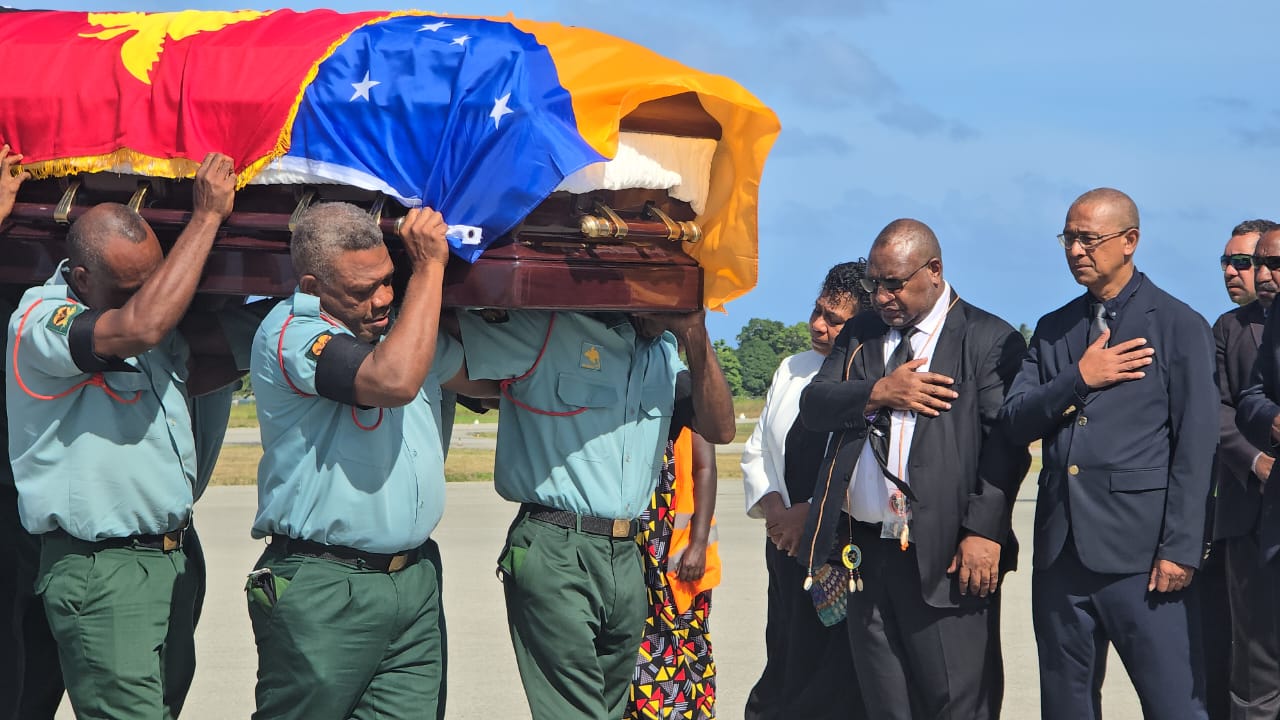– Prime Minister James Marape has delivered a moving tribute at the burial of Right Honourable Sir Julius Chan, honouring his unparalleled service, statesmanship, and enduring legacy in Papua New Guinea.
Speaking before Sir Julius’ family, the people of New Ireland, and the nation, Prime Minister Marape reflected on his extraordinary contributions to PNG’s political and economic landscape, describing him as one of the nation’s most influential and transformative leaders.
“Sir Julius was a giant among men,” Prime Minister Marape said.
“If Sir Michael Somare was the North Pole of Papua New Guinea’s politics, then Sir Julius Chan was the South Pole—together shaping the modern nation we call home.”
Sir Julius’ legacy is deeply intertwined with PNG’s nationhood, dating back to 1968, when he led a delegation to the United Nations, advocating that Papua New Guinea was ready for independence. He entered Parliament that same year, joining the pioneering generation that would steer the country toward self-governance and eventual independence from Australia in 1975.
As a founding figure of the People’s Progress Party (PPP), Sir Julius formed a coalition with Pangu Pati in 1972 to prepare PNG for self-government and independence. His role in shaping the country’s economic foundation was profound—he helped establish the Bank of Papua New Guinea and introduced the kina and toea in 1975, overseeing the phasing out of the Australian dollar as PNG asserted its financial sovereignty. Prime Minister Marape reflected on Sir Julius’ distinguished career, highlighting key moments in his leadership, from his rise as Deputy Prime Minister in the mid 1970s to becoming PNG’s second Prime Minister in 1980—the first leader to ascend to the role through a successful vote of no confidence (VONC).
“He was the first architect of our financial institutions and economy, the founder of our Central Bank, and the man who helped shape the value of our kina,” Prime Minister Marape stated.
“He stood in many of the monumental moments of our nation’s 49-year history and played a defining role in PNG’s place in the United Nations.”
Sir Julius continued to play a critical role in PNG’s political evolution, helping Paias Wingti become the third Prime Minister in 1985 through another successful VONC. He later returned to the prime ministership in 1994, following Wingti’s removal as Prime Minister, further cementing his status as one of the country’s most influential leaders.
His second tenure as Prime Minister was marked by some of PNG’s most defining moments, including leading the country through the devastating Rabaul volcanic eruption in 1994, and presiding over the floating of the kina in 1994, a move that fundamentally changed PNG’s economy. However, his leadership was most tested during the 1997 Sandline Crisis, a moment of political turmoil that led him to step aside for the sake of the nation’s stability.
“He willingly stepped down as Prime Minister in 1997, showing his humility and commitment to national unity,” Prime Minister Marape said. “Few leaders in history have had the wisdom and strength to make such a sacrifice.”
Sir Julius made history once again in 1997, becoming the first sitting Prime Minister to lose an election, a moment that shocked the nation. However, he remained deeply committed to public service and, a decade later, won his way back into politics, becoming the Governor of New Ireland in 2007—a role he held until his passing, championing regional autonomy, economic growth, and social development for his people.
“Sir Julius represented humility, kindness, dedication, patriotism, lawful living, management of time, honesty, tolerance of diverse opinions, and above all, a visionary leader,” Prime Minister Marape remarked.
Prime Minister Marape assured the people of New Ireland that Sir Julius’ contributions will be preserved for generations to come, announcing that Pangu Pati will support the establishment of the Sir Julius Chan Museum in Kavieng to preserve his speeches, writings, and leadership philosophies.
“No monument can truly encapsulate the legacy of Sir Julius, but we will ensure that his wisdom and leadership are never forgotten,” the Prime Minister stated.
As Papua New Guinea approaches its 50th anniversary of independence, Prime Minister Marape called on the nation to reflect on the sacrifices and dedication of its founding fathers.
“You and I know some of the conversations we have had,” Prime Minister Marape said.
“I want to say, I am sorry if I have not lived up to your expectations, but we look forward to correcting the past and moving forward for the good of our people.”
As he concluded, the Prime Minister expressed deep sorrow and gratitude for Sir Julius’ lifetime of service.
“Sir Julius, you have set sail on your final journey, and I wish you eternal peace as you find He reassured the people of New Ireland that the national government stands in solidarity with them, as they mourn and celebrate the life of one of PNG’s greatest leaders.
“I will return when the traditional ceremonies continue for the conclusion of his entire burial process. You will see me back here,” Prime Minister Marape pledged.


